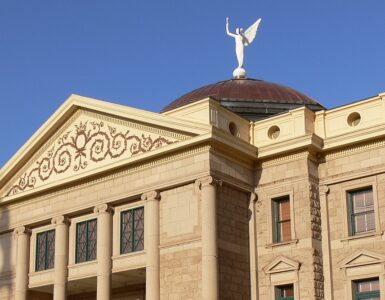This column originally appeared in The Arizona Capitol Times.
With another successful Super Bowl in the books, Arizona says goodbye to the hundreds of thousands of visitors who flocked to the Valley this past week, and hello to the hundreds of millions of dollars in revenue that will benefit our state economy for years to come.
Super Bowl LVII marks the fourth time Arizona has hosted the big game, and it’s easy to see why we’d be an obvious choice. What better place to spend a few days in February than a state that welcomes out-of-towners with sunny skies and temperatures in the mid-70s? That it happens to coincide with the “Greatest Show on Grass” certainly doesn’t hurt.
These are the kinds of events other states clamor for. They provide an unmatched opportunity to showcase Arizona to the world. They generate massive revenue that not only benefits our sales tax base, but also the bottom line for our hoteliers, restaurateurs, retailers and attractions.
Economists estimate that in 2015 the Super Bowl resulted in a nearly $720 million windfall for our state, and Super Bowl LVII is expected to bring a similarly massive boost to the state economy.
It’s all part of Arizona’s sports tourism sector, which is responsible for a $24.2 billion contribution to the state’s Real Gross Domestic Product, according to new research from the Common Sense Institute Arizona. The study finds that nearly 350,000 Arizona jobs are directly or indirectly related to the sports and tourism sector.
But those numbers don’t even tell the full story. They don’t account, for example, for the long-term and significant business investments that these opportunities create. Because in addition to attracting hundreds of thousands of football fans and tourists to Arizona, the Super Bowl also brings to town the top executives from all over the country – and gives us a platform to show off the pro-growth policies and talented workforce that have made Arizona among the best places in the nation to do business.
Arizona recognizes the power of the Super Bowl in driving economic activity and business investment, and in 2022 the state created a Major Events Fund to attract and support large-scale events in Arizona. Housed under the Arizona Commerce Authority, the Fund not only helps cover the costs of hosting these events, but also can be used for providing grants to local organizing committee partners and paying for associated economic development activities.
As established under the Fiscal 2023 budget, the state provides $7.5 million annually to the Fund. This year, that appropriation is in doubt, as the funding was removed as part of the governor’s proposed Fiscal Year 2024 executive budget.
Maintaining the Major Events Fund will become increasingly important as hosting the game becomes increasingly expensive. According to Super Bowl Host Committee president and CEO Jay Parry, Arizona had to pledge between $12 million and $13 million to score the Super Bowl in 2008; by 2015, the price tag rose to about $28 million.
Not only is hosting the Super Bowl becoming more expensive, it’s becoming more competitive every year. We’re competing with other states that have similar funds and more cities with gleaming new facilities, including next year’s host Las Vegas, are vying to enter the competition to host a Super Bowl. Keeping our event fund in-tact and as robust as intended in the FY 2023 budget will ensure Arizona continues to have a leg-up in attracting mega events and conventions that might otherwise be held elsewhere.
We know lawmakers have a lot of decisions to make when it comes to negotiating Arizona’s state budget, and we recognize the need to prioritize wisely and invest in what’s going to be best for our economic future. If that’s their commitment, then keeping our Major Events program funded should be a priority.
We all want to see Arizona continue to be a top-tier destination for the Super Bowl and other mega-events, like the NCAA Men’s Basketball Final Four, which Glendale will host in 2024. We look forward to working with the state Legislature and Gov. Katie Hobbs to ensure this $7.5 million commitment is reflected in the FY 2024 budget. It’s a small price to pay for the outsized and long-lasting impact it will have on Arizona’s economy.
Danny Seiden is the president and CEO of the Arizona Chamber of Commerce & Industry.
















Add comment